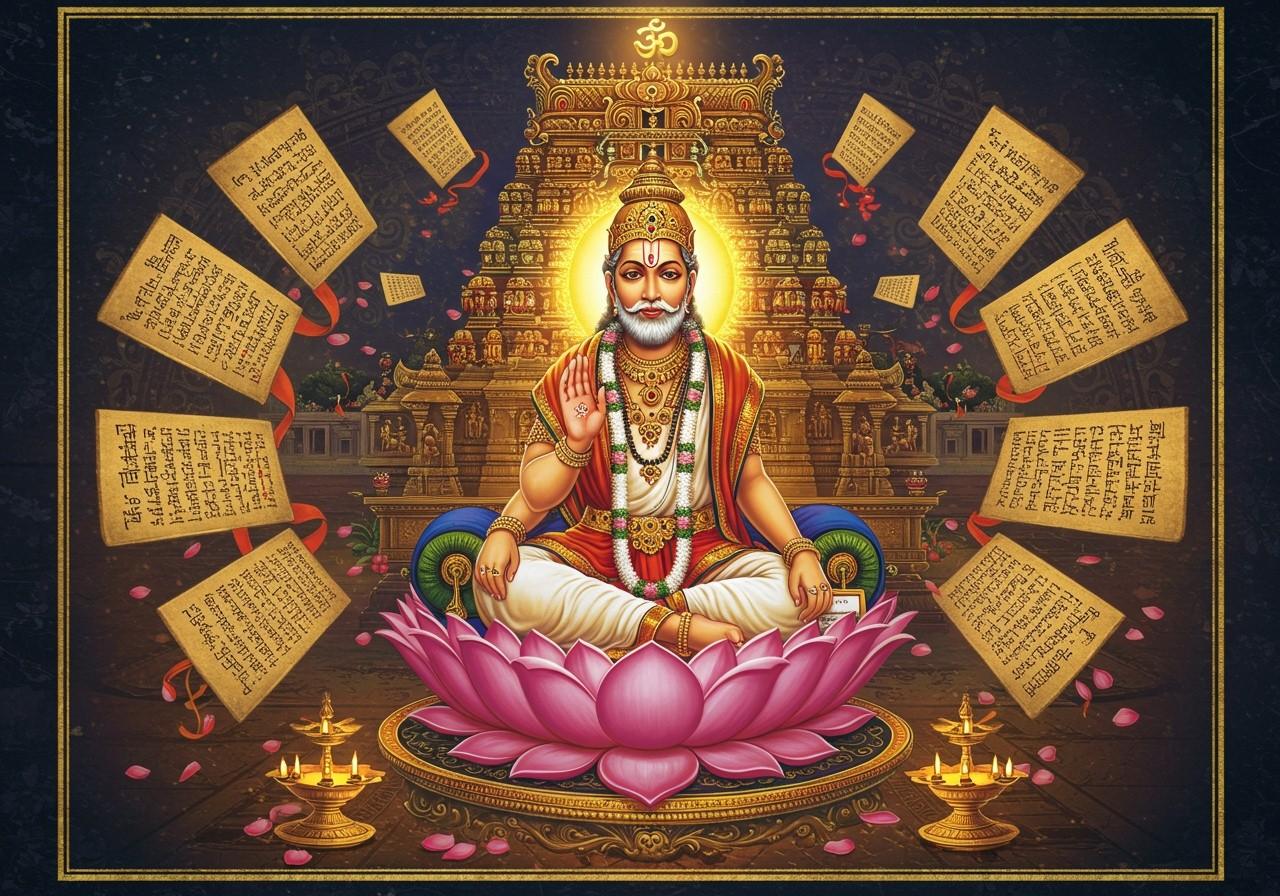
Ramanuja (c. 1077-1157 CE), also known as Ramanujacharya, remains a revered figure in the tapestry of Indian philosophy and spiritual tradition. A prominent philosopher, guru, and social reformer, he significantly shaped the Sri Vaishnavism tradition within Hinduism. His teachings, particularly his Vishishtadvaita philosophy (qualified non-dualism), emphasize devotion (bhakti) to Vishnu as a path to liberation (moksha). His profound insights continue to inspire ethical living, communal unity, and a deeper understanding of the divine.
Ramanuja’s Influence on Sri Vaishnavism
Ramanuja’s contributions to Sri Vaishnavism are immense. He’s considered the central philosopher of the tradition. He systematized its theological framework and rejuvenated temple worship, making it a vibrant practice for devotees. His focus on devotion (bhakti) to Vishnu and the concept of total surrender (saranagati) are central tenets of Sri Vaishnavism. Ramanuja’s teachings offer a path to moksha, emphasizing the importance of both personal devotion and ethical conduct within the community.
Key Aspects of Ramanuja’s Philosophy (Vishishtadvaita)
-
Qualified Monism: Vishishtadvaita acknowledges the reality of both the individual soul and the material world, seeing them as integral parts of Brahman (Lord Narayana). This contrasts with Advaita Vedanta’s view of the world as Maya (illusion). It emphasizes the interconnectedness of all beings with the divine.
-
Reality of the World: Ramanuja viewed the world as a real manifestation of Brahman’s nature, not as an illusion. This perspective emphasizes the sacredness of creation and the importance of engaging with the world in a righteous manner. He viewed the world as having its own distinct ontological reality.
-
Attributes of God: For Ramanuja, God’s attributes are real and permanent, not merely human projections. These attributes provide a way for devotees to understand and connect with the divine. Through observing these attributes, devotees can develop a deeper relationship with the divine.
-
God as a Complex Whole: Ramanuja’s concept of God, Lord Narayana, is a complex organic whole encompassing all of existence. This emphasizes the unity of the divine despite its multifaceted nature. All things are aspects of this divine whole.
Ramanuja’s Literary Works
Ramanuja’s literary contributions provide a comprehensive understanding of Sri Vaishnavism. These works explore the philosophy, theology, and practices of the tradition, offering guidance for spiritual seekers. His commentaries provide profound insights into sacred texts, while his devotional hymns inspire deep reverence for the divine.
-
Sri Bhashya: This detailed commentary on the Brahma Sutras is considered a foundational text within Sri Vaishnavism. Tradition holds that Goddess Saraswati herself named the work. It offers a comprehensive interpretation of the Brahma Sutras through the lens of Vishishtadvaita.
-
Bhagavad Gita Bhashya: Ramanuja’s commentary on the Bhagavad Gita provides a unique Vaishnavite perspective on this sacred text. It emphasizes the importance of devotion and surrender to Lord Krishna. The Gita Bhashya remains a vital resource for understanding Ramanuja’s philosophical framework.
Explore the influence of Hindu spirituality on our collection.
-
Vedarthasamgraha: Meaning “Summary of the Vedas’ Meaning,” this work condenses the core teachings of the Vedas. It serves as a key resource for understanding the philosophical foundations of Sri Vaishnavism. This work illuminates the essential principles of Vedic thought.
-
Vedantadipa and Vedantasara: These texts delve deeper into the nuances of Vedanta philosophy. They provide further elucidation of Vishishtadvaita and its implications for spiritual practice. These works are key texts for those studying Hindu philosophy.
-
Gadya Trayam: This compilation includes three devotional hymns: Sharanagati Gadyam, Sriranga Gadyam, and Vaikuntha Gadyam. These beautiful compositions express deep devotion and surrender to Lord Vishnu. They are often recited in Sri Vaishnava worship services.
-
Nitya Grantham/Nityam: This text outlines the rituals and procedures for worshipping the deity form of the Lord. It provides practical guidance for devotees seeking to engage in proper worship according to Sri Vaishnava tradition. It ensures the correct execution of sacred rituals.
Poojn.in: Your Resource for Sri Vaishnava Tradition
At Poojn.in, we offer a wide selection of products and resources for those seeking to learn more about Ramanuja and the Sri Vaishnava tradition. From sacred texts and commentaries to ritual items and puja accessories, you’ll find everything you need to deepen your practice. Poojn.in is your one-stop shop for authentic and high-quality cultural goods.
Visit poojn.in today to explore our collection.


